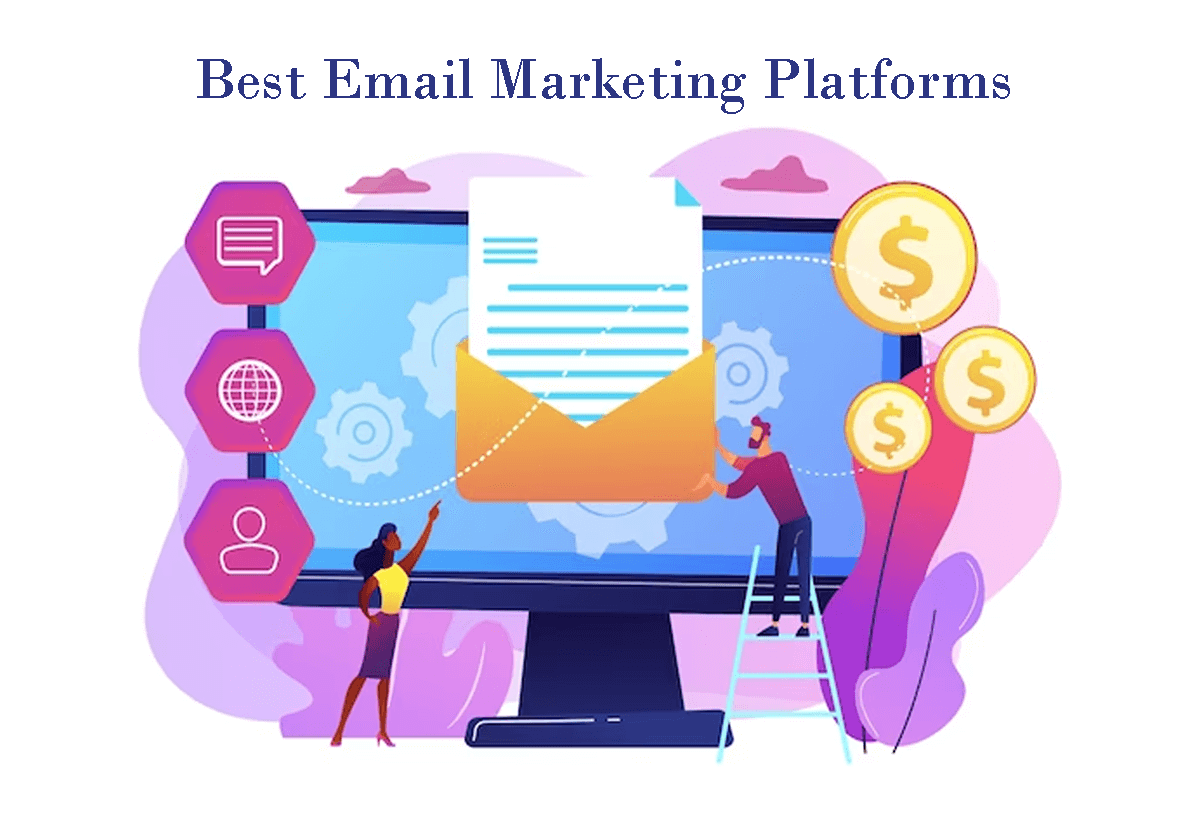What's Inside?
Best Email Marketing Services
- Mailchimp
- Zoho Campaigns
- Mailerlite
- Campaigner
- Moosend
- Constant Contact
- Campaign Monitor
- GetResponse
- ActiveCampaign
- Drip
- HubSpot
- Sendinblue
What is an email marketing service?
An email marketing service is a software platform that allows businesses to create, send, and manage email marketing campaigns. It typically provides features such as email design templates, list management, automation tools, and analytics to help businesses reach and engage with their subscribers. Email marketing services are often used to build relationships with customers, promote products or services, and increase sales. They also provide metrics and analytics to help businesses measure the success of their email campaigns and make data-driven decisions to improve their marketing strategies.
Why Does Email Marketing Matter?
 Email marketing matters because it is one of the most effective and efficient ways to reach and engage with your target audience. Here are some reasons why email marketing is important:
Email marketing matters because it is one of the most effective and efficient ways to reach and engage with your target audience. Here are some reasons why email marketing is important:
- High ROI: Email marketing has one of the highest returns on investment (ROI) of any marketing channel. For every dollar spent on email marketing, you can expect an average return of $42.
- Targeted messaging: With email marketing, you can segment your audience and deliver targeted messages to different groups based on their interests, behavior, or demographics.
- Customer retention: Email marketing helps you stay in touch with your customers and keep them engaged with your brand. It can be used to build loyalty, upsell, and cross-sell.
- Measurable results: Email marketing provides detailed analytics that allows you to track open rates, click-through rates, conversion rates, and other key performance indicators.
- Cost-effective: Compared to other marketing channels, email marketing is relatively inexpensive. You can reach a large audience with a single email campaign, and there are many affordable email marketing platforms available.
Email marketing is a powerful tool that can help you grow your business, increase customer loyalty, and drive revenue.
What to Look for in a Good Email Marketing Tool?
When choosing an email marketing service, there are several important factors to consider. Here are some things to look for:
- Ease of use: Look for a platform that is user-friendly and intuitive, with drag-and-drop editors and customizable templates.
- Automation capabilities: A good email marketing service should allow you to automate your campaigns, such as sending welcome emails or abandoned cart reminders.
- List management: The ability to segment your email list based on subscriber behavior or other criteria can help you send more targeted and effective campaigns.
- Deliverability: The email marketing service should have a high deliverability rate to ensure your messages reach your subscribers’ inboxes.
- Analytics and reporting: The ability to track open rates, click-through rates, and other metrics can help you evaluate the success of your campaigns and make data-driven decisions.
- Integrations: Look for a platform that integrates with other marketing tools and software you may already be using, such as social media management tools or customer relationship management (CRM) software.
- Customer support: A good email marketing service should offer reliable customer support, including phone, email, or chat support, as well as helpful resources such as tutorials and webinars.
By considering these factors and choosing an email marketing service that meets your specific needs, you can create effective campaigns that engage your subscribers and drive results.
Why Choosing The Best Email Marketing Service is Important?
Small businesses can benefit from email marketing, which is a cost-effective marketing strategy. In the United States, email marketing generates an average return on investment (ROI) of 4300%, according to the Direct Marketing Association. One of the reasons for this high ROI is that email marketing is easy to manage, provides full control, and allows direct contact with customers.
Your success with email marketing largely depends on the email marketing software you choose. The software is responsible for ensuring that your emails are delivered effectively. If you choose the wrong software, you may end up paying more money for fewer marketing features and experience poor email deliverability rates, which can cause you to lose money. Therefore, it’s crucial to choose the right email marketing software for your business.
What Should Email Marketing Platforms Do?
 Email marketing platforms should provide a comprehensive set of features to help businesses create, send, and track email campaigns. Here are some of the key functions that email marketing platforms should offer:
Email marketing platforms should provide a comprehensive set of features to help businesses create, send, and track email campaigns. Here are some of the key functions that email marketing platforms should offer:
- Email campaign creation: The platform should offer an intuitive drag-and-drop editor that allows users to create professional-looking emails with ease. It should also support responsive design, so emails look great on any device.
- List management: The platform should provide tools to manage and segment email lists, as well as automate list cleaning to ensure that email addresses are valid and up-to-date.
- Automation: The platform should offer the ability to automate email campaigns, from welcome emails to post-purchase follow-ups. This helps businesses save time and effort while delivering targeted messages to customers.
- Personalization: The platform should enable businesses to personalize emails with dynamic content based on subscriber data, such as location, purchase history, and preferences.
- Reporting and analytics: The platform should provide detailed reports on email campaign performance, including open rates, click-through rates, and conversion rates. This allows businesses to measure the success of their campaigns and make data-driven decisions.
- Integration: The platform should integrate with other marketing tools, such as CRM software and social media platforms, to streamline workflows and create a cohesive marketing strategy.
Which Platform Should You Choose?
Choosing an email marketing platform depends on your specific needs and goals. Some popular email marketing platforms include Mailchimp, Constant Contact, Campaign Monitor, and Sendinblue, among others.
To determine which platform is the best fit for you, consider factors such as pricing, ease of use, automation capabilities, integrations with other tools, reporting and analytics, deliverability rates, customer support, and any unique features that are important to your business.
It’s also a good idea to test out a few platforms by signing up for free trials and seeing how they work for you before committing to a subscription. Ultimately, the best platform is one that meets your needs, helps you achieve your marketing goals, and fits within your budget.
Best Email Marketing Platforms FAQs
- Newsletter: This is a regular email that is sent on a recurring basis to subscribers who have opted in to receive updates from the business. Newsletters usually contain a mix of informational and promotional content.
- Promotional emails: These are emails that promote a specific product, service, or sale. They can be sent to the entire subscriber list or to a targeted segment of subscribers who are most likely to be interested in the promotion.
- Welcome email: This is the first email that new subscriber receives when they sign up for a business's email list. It typically includes a welcome message, information about the business, and an invitation to engage with the brand on social media or visit the website.
- Abandoned cart email: These emails are sent to customers who have added items to their online shopping cart but haven't completed the purchase. The email can include a reminder about the items in the cart and an incentive to complete the purchase.
- Re-engagement email: This is an email that is sent to subscribers who haven't engaged with the brand's emails in a while. The email can include a special offer or incentive to encourage the subscriber to start engaging with the brand again.
- Triggered emails: These are automated emails that are triggered by specific actions or events, such as a customer making a purchase or a subscriber's birthday. These emails can be highly personalized and targeted to the individual recipient.
- Direct sales: Email marketing can be used to directly promote and sell products or services to customers. By sending targeted and personalized emails with enticing offers, businesses can increase the chances of customers making a purchase.
- Repeat business: Email marketing can help businesses stay top of mind with their existing customers, encouraging them to make repeat purchases. By sending relevant and engaging content, businesses can create loyal customers who come back again and again.
- Upselling and cross-selling: Email marketing can be used to upsell or cross-sell products or services to customers who have already made a purchase. By sending targeted and personalized emails with relevant suggestions, businesses can increase the value of each sale.
- Lead generation: Email marketing can be used to generate leads by offering valuable content and incentives in exchange for contact information. By building an email list of potential customers, businesses can nurture these leads and eventually convert them into paying customers.
- Drive traffic to your website: If you include links to your website in your email campaigns, you can drive more traffic to your site. The more traffic your site receives, the higher your search engine rankings may climb.
- Increase social shares: Including social sharing buttons in your emails can encourage your subscribers to share your content on their social media accounts. This can help increase your social media presence, which can indirectly benefit your search engine rankings.
- Boost engagement metrics: When subscribers engage with your emails (such as opening, clicking, or forwarding), it can signal to search engines that your content is relevant and valuable. This can potentially lead to higher search engine rankings.


